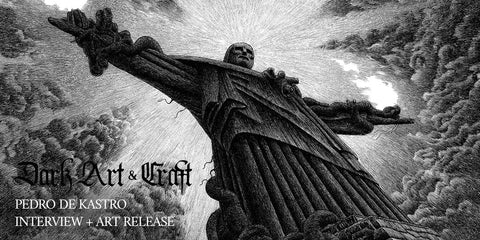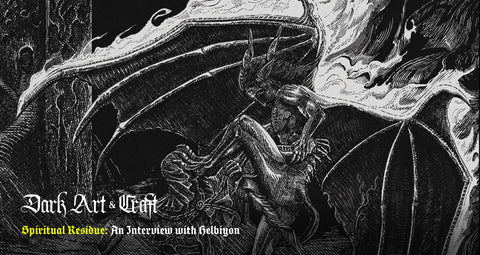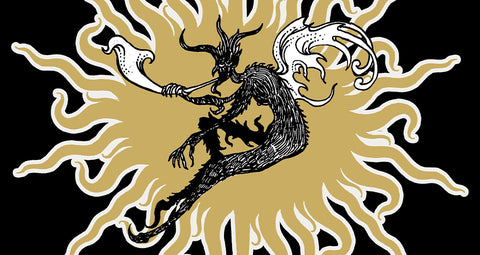
Joseph Anton Koch (1768-1839), Hell (study for Casa Massimo frescoes) (c 1825) Image via https://en.wikipedia.org/wiki/Joseph_Anton_Koch
Devils, demons, and creatures have held a popular place in lore and Art since ancient civilization. It's safe to say Dark Art as a genre is centered around them as the lead in their tableaus. Regardless of the era, devils and demons continually play their evil roles, despite the fact that the word demon's etymology comes from a place of divine spirit or power. The word itself was first seen in Plato's writing, used to describe his inspiration for his philosophy.
So, when did it shift? One of the first western written connotations come from the Hebrew Bible, describing some of the polytheistic people of Northern Africa. Other opinions have suggested that it was indeed Abrahamic religions (Judaism, Christianity, and Islam) that painted the idols and multiple gods of pagan religions in a negative light. A lot of folks pinpoint the transition to negative demonic imagery in the Late Antiquity period or the fourth century. Spearheaded by the first-ever, no surprise here, Christian Emperor, Constantine I.

Ancient Sumerian impression showing the God Dumuzid being tortured in the underworld by gallu demons. Image via https://en.wikipedia.org/wiki/Ancient_Mesopotamian_underworld
Even earlier, like 900-700 BCE, the Mesopotamians are known for demons, most commonly they were a part of the mosaic of their underworld. The name of the game for these gallu was terrorizing the mortals of earth, every now and then dragging their bodies down to the underworld of Kur. Not only were demons guardians and underlings of the underworld, but there were several demonic gods as well. A vision of terror, Lamashtu was believed to feed on the blood of infants, and was believed to have a lion head, donkey teeth, long gnarled nails and hands stained from reaping the young innocent. This is some shit. Ironically, another god, Pazuzu, that is believed to be the only god strong enough to banish Lamashtu back to the underworld, is also considered a demon that could possess people. If the name sounds familiar, you're right: this is the god that possessed Reagan in The Exorcist.

Statuette of the demon Pazuzu, Mesopotamia, 8th/7th BCE, Image via https://www.reddit.com/r/ArtefactPorn/
Many of the pieces from the Dark Art & Craft curated Demons, Devils and Creatures collection come from either the Late Gothic or the Romantic Artistic movements. The Gothic movement is known for its strict religious imagery. As the period moved from the Medieval era, work progressed from flat icons to more realistic individuals marked by new innovative perspective techniques.

The Temptation of St Anthony c. 1480-90. Engraving The Metropolitan Museum of Art, New York image via Wikipedia
Take for instance, The Temptation of Saint Anthony by Martin Schongauer. In one version of many of the story, St. Anthony's devotion to abstinence from indulgence has granted him the ability to levitate and demons are said to have come to attack him down back to earth, hoping to tempt him from his path of piety. One of the most unsettling things about this piece is the demons themselves. A cacophony of the beasts, these natural monsters are a hodgepodge of all the animal kingdoms combined into upsetting but oddly familiar images. These monsters move around open space, unconstrained by any semblance of a background. Honestly, I think the looseness of this piece makes it all the more unnerving.
Revised and color corrected print The Temptation of St. Anthony is an engraving, 1470-75, work by Martin Schongauer on DarkArtandCraft.com

The Last Judgment is a triptych attributed to Flemish painter Hans Memling painted between 1467 and 1471 now held in the National Museum in Gdańsk in Poland. Image via Wikipedia
Image via https://archive.org/details/dictionnaireinfe00coll_1/page/n10, available in collection
While the Gothic period seems to be reveling in Christian imagery, the Romantic movement is characterized by the melding of Art with intellect. The emotionally charged period idolizes individuality, which made for a lot of dissent and boundary crossing in the period's work. The period broke the binding rules of what was and wasn't in prior movements, and prioritized the artistic vision above all. The great artist Caspar David Fredrich says it best (about creation specifically pertaining to the Romantic period) "the Artist's feeling is his law".
The Prince of Darkness; Dagol; c. 1775. Prince of Darkness: Dagol' devouring human limbs. on DarkArtandCraft.com
Deumus Demon of Calicut c 1863 She wears a crown, has 4 horns on her head and 4 hooked yet strong teeth in her mouth.
One text that is so iconic during the Romantic period is the Dictionaire Infernale. Written by Jacques Auguste Simon Collin de Plancy and inspired by the great thinker of the time Voltaire, he created an expansive demonic hierarchy first published in 1818. The most famous rendition of this book (with one of the images based above) is the ninth edition that features the work of French artist Louis Le Breton. The edition was published in the 1860s and includes the above image of Deumus in its folds.

Image via https://publicdomainreview.org/2017/10/25/defining-the-demonic/
Dibolical Artwork created by the Limbourg Brothers, “Lucifer Torturing Souls as well as Being Tortured Himself in Hell” from Les Très Riches Heures du duc de Berry. Our reproduction and retouching is now available in 12" × 16" framed Art poster prints. on DarkArtandCraft.com
Resources & Art Links
Interested in viewing more demons, devils, and creatures?
Check out more of the series in our online store.
Angels and Demons in Art
Depictions of Hell in Art History
Legendary creatures and demons in Hindu mythology
The Art of the Devil an Illustrated History









